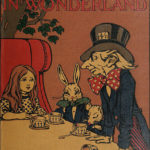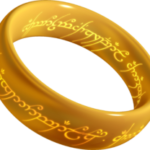Primary Colors And Their Use
Painters seldom paint with primary colors. Generally those building blocks become the components of a more complex color and various shades of it. In many ways, writing can be equated with the use of primary colors. J. R. R. Tolkien used that metaphor, anyway, when he explained his thoughts about fantasy—or fairy stories, as he called them.
I’ve wondered what J. R. R. Tolkien would think about today’s darker fantasies. Would the author of “On Fairy-Stories” be a fan of stories about vampires or dystopian worlds filled with violence? These are interesting questions.
For whatever reason, when Christmas roles around each December, my thoughts turn to fantasy. I love nothing better than snuggling under a warm blanket on a cold wintry day, and reading a favorite fantasy. It’s how I role. And what better way to think about fantasy than to look again at what the master of fantasy had to say on the subject.
Tolkien believed that fairy stories were a means to three particular desirable conditions: recovery, escape, and consolation.
Escape
Many speculative writers are familiar with his thoughts on escape. I myself have written a number of posts on the subject here at Spec Faith (see for example “What to Make of Dragons, Part 7 – Escapism”). We probably know less about his thoughts on recovery and consolation, however. In exploring what he wrote about the former, I find ideas that suggest how he might react to today’s fantasy.
Recovery Defined
First, what exactly did Tolkien mean by “recovery”?
Recovery (which includes return and renewal of health) is a re-gaining — regaining of a clear view . . . We need, in any case, to clean our windows; so that the things seen clearly may be freed from the drab blur of triteness or familiarity—from possessiveness. Of all faces those of our familiares are the ones both most difficult to play fantastic tricks with, and most difficult really to see with fresh attention, perceiving their likeness and unlikeness: that they are faces, and yet unique faces. This triteness is really the penalty of “appropriation”: the things that are trite, or (in a bad sense) familiar, are the things that we have appropriated, legally or mentally. We say we know them. They have become like the things which once attracted us by their glitter, or their color, or their shape, and we laid hands on them, and then locked them in our hoard, acquired them, and acquiring ceased to look at them.
I wonder if this familiarity might not be a serious problem for Christian writers, explaining why our fiction, even our fantasies, seem to lack a freshness. We know the rudiments of our faith, and it is these elemental principles that we realize the rest of the world needs to embrace, so we convey them over and over until they lose some of their power and potency, even for us.
God is a God of grace. Jesus died for our sins. Ho-hum, Christmas again, a celebration of the Incarnation. Familiar terms trip off our tongues with ease, but with less and less meaning. And the concepts find their way into our fiction, but with less and less force.
The need, Tolkien suggests, is recovery, but many writers despair:
Who can design a new leaf? The patterns from bud to unfolding, and the colors from spring to autumn were all discovered by men long ago. But that is not true. The seed of the tree can be replanted in almost any soil . . . Spring is, of course, not really less beautiful because we have seen or heard of other like events: like events, never from world’s beginning to world’s end the same event. Each leaf, of oak and ash and thorn, is a unique embodiment of the pattern, and for some this very year may be the embodiment, the first ever seen and recognized, though oaks have put forth leaves for countless generations of men.
We do not, or need not, despair of drawing because all lines must be either curved or straight, nor of painting because there are only three “primary” colors.
In the same way, Christian writers need not despair because there is only one way to salvation, because there is only one begotten Son of God, because by grace alone may we be reconciled to God. In other words, Truth is not limiting to the writer since it impacts people in different ways. Christians, however, seem to tell the Old, Old Story in an old, old way.
A writer who recognizes weariness of The Same, will inevitably try to break free:
there may be a danger of boredom or of anxiety to be original, and that may lead to a distaste for fine drawing, delicate pattern, and “pretty” colours, or else to mere manipulation and over-elaboration of old material, clever and heartless. But the true road of escape from such weariness is not to be found in the wilfully awkward, clumsy, or misshapen, not in making all things dark or unremittingly violent; nor in the mixing of colors on through subtlety to drabness, and the fantastical complication of shapes to the point of silliness and on towards delirium. (Emphasis mine.)
Recovery Advocated
So Tolkien apparently saw no answer in exploring to the edges (or beyond) of Truth and Beauty. Rather, the great need is Recovery.
Before we reach such states we need recovery. We should look at green again, and be startled anew (but not blinded) by blue and yellow and red.
Being “startled anew” by God’s love, for example, a Christian writer is freed to make old truth shine like a new beacon:
Creative fantasy, because it is mainly trying to do something else (make something new), may open your hoard and let all the locked things fly away like cage-birds. The gems all turn into flowers or flames, and you will be warned that all you had (or knew) was dangerous and potent, not really effectively chained, free and wild; no more yours than they were you.
 So what do you think? Would Tolkien believe that gems turned into flowers, or flames in the darker contemporary fantasies? In dystopian fiction or urban fantasy? Or would he think these things “dark or unremittingly violent” or “mixing of colours on through subtlety to drabness, and the fantastical complication of shapes to the point of silliness and on towards delirium”? would he see vampire and werewolf stories as appropriate use of the primary colors an author has in his pallet?
So what do you think? Would Tolkien believe that gems turned into flowers, or flames in the darker contemporary fantasies? In dystopian fiction or urban fantasy? Or would he think these things “dark or unremittingly violent” or “mixing of colours on through subtlety to drabness, and the fantastical complication of shapes to the point of silliness and on towards delirium”? would he see vampire and werewolf stories as appropriate use of the primary colors an author has in his pallet?
My guess? He’d see a few gems but a lot of drabness and maybe even some delirium in the stories of today.
Much of this article is a reprint of a post from December 2011.
Featured Photo by Paul van Dijk from FreeImages









































This is a great article. I agree with your opinion on what Tolkien might think about modern fantasy. I think he’d be displeased with much of it, and delighted by some of it–as we all are, and as we always have been. Modern writing tends to be of a higher caliber, but he mentions art with heart. That has always been difficult to find. Writing with heart that also has quality. I just started re-reading Le Guin’s The Other Wind, and feel that some of her work (that book included) intersect what resonates deeply with my heart, and with what is just plain fantastically well-done creative work. It speaks to me, and helps me recover the truths I’ve known too long, and that moves me!
If you think about it, LOTR is pretty much a dystopia. Middle Earth has declined from glorious eras of both Elves and Men. The landscape is dotted with the ruins of cities that were once great but have moldered away. Gondor is ruled by this one guy who went cuckoo for Cocoa Puffs after staring into the abyss a bit too long. Plenty of creeping dread to go around.
It’s not a true dystopia in the least. It’s a way of showing how the old world blended into our own. A transition period merging the myth of the Silmarillion with modern Europe. Though it’s true there’s a lot of dread, there’s also a lot of simple pleasures and joys and beauty. It’s the fact that those are under attack that helps the reader (and characters) “Recover” the simple joys, like when the Hobbits return to the Shire (after shooing Saruman) and appreciate it for what it is.
He probably would think there’s some gems and some things that are ‘too dark’ or ‘heartless’ or something. But maybe we’d be surprised by what he’d like and dislike. In some ways, stories were darker back then. In certain time periods, there probably wasn’t even much distinction between stories told to adults and stories told to children. In ancient cultures, the darker aspects of life were probably so close that they simply couldn’t be hidden from children.
Many classics are pretty dark. Tragedy and cautionary tales were a thing. There would probably be many stories that he would like after people pointed out how those dark tales were tragedies or cautionary. In fact, wasn’t Children of Hurin pretty dark and tragic?
Maybe Tolkein would find no value in modern dark, tragic stories. If so, that’s sad. Just because something is violent and dark doesn’t mean there’s no hope or valuable lessons to be obtained from it. Fate Zero’s a great example. I don’t QUITE agree with the conclusions this video comes to, but it does point out some important aspects these two chars play in this story:
https://www.youtube.com/watch?v=J2CJME_VOyM&pbjreload=10
Unfortunately it uses the English dubbed clips, so the voice acting doesn’t quite do the show justice. And the analysis kinda idealizes Alexander (Rider) too much, and I did take some slightly different things from the show than the Youtuber did. But, the vid does portray some of the show’s overall value. Sadly, not everyone will notice that value because they get bored with the show too early or get so upset at the dark parts that they refuse to pay attention to the good parts. Even Kiritsugu and Arthur’s (Saber’s) arcs are actually a lot brighter than the video paints them. Even if their stories ended tragically, they had a chance to LEARN from what they went through.
So…I dunno. People seem to dismiss a lot of dark stories without understanding them or giving them their due. Even stories without a lot of brightness, comic relief, or chars like Waver and Alexander have merit. Breaking Bad had a lot of great insights into human nature and served as a cautionary tale about what can happen when people pick the wrong ambitions and pursue them too hard, for example.
But that comes down to a very important thing with stories. One of the primary purposes they serve is learning and teaching. Sometimes that can be done with bright fluffy stories and sometimes it needs to be done with dark tales that warn us so we don’t have to go through as much as the characters did. Or, if we do go through the same heartache the chars do, the chars’ experiences can help us make sense of our own.